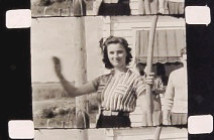VERKEHRTE WELT
Günter Dubiel, 1960, 8mm, b&w, sound, 10:01
Location: Berlin
GESICHTER IN UNSERER STADT
Günter Dubiel, 1979, Super 8, color, sound, 8:43
Location: Berlin
Shown at Home Movie Day Berlin
Transfers by Screenshot
Films courtesy of Deutsche Kinemathek, www.deutsche-kinemathek.de
Copyright Deutsche Kinemathek
Thanks to: Anke Hahn, Martin Koerber, Carsta Knaack
About the Films
Günter Dubiel (1923-2008) was an amateur filmmaker from Berlin. Throughout a lifelong career as an accounting clerk he lived a second life as an artist, musician, and filmmaker.
Dubiel began making silent 9.5mm films in the 1940s, then switched to 8mm and began experiments in sound technology. His interest in soundtracks grew out of his love of music, and he accompanied his films with commercial recordings or scores that he improvised on piano and synthesizer. His 8mm soundtracks were created on a separate magnetic tape using a mechanic sound coupler, and later he shot on Super8 with an electronic sync system. He owned two sync units and two projectors he could run with one tape machine for longer films, some of which were two or three reels long. He screened his longer uninterrupted programs of short films with a changeover to the second projector with an audiotape cuing system.
Despite his technical skill, he was not interested in entering his work in amateur film contests or showing his films publicly. In 2007 his wife read an article about Berlin’s Home Movie Day at the Deutsche Kinemathek in the newspaper and prodded a reluctant Dubiel to attend and show his films. After first declining, he then got up in the night to see if his old equipment still worked. The next day they both attended Home Movie Day, where Dubiel had to screen the films himself because he was the only one who knew how to run his complicated sync system, which included a projector, open reel magnetic recorder and sync unit.
After Home Movie Day, Mrs. Dubiel feared what would ultimately become of his films and equipment, so she convinced her husband to stay in contact with Martin Koerber, Film Curator at the Kinemathek, who had expressed interested in acquiring the collection. Her concern was prescient, as he passed away soon afterward, and his collection was donated to the Deutsche Kinemathek.
–Dwight Swanson

